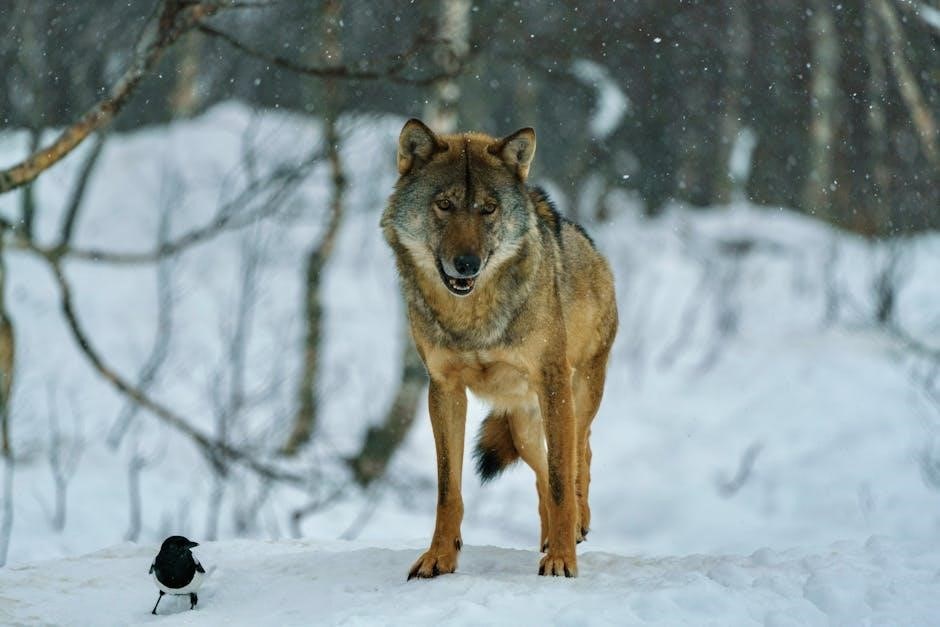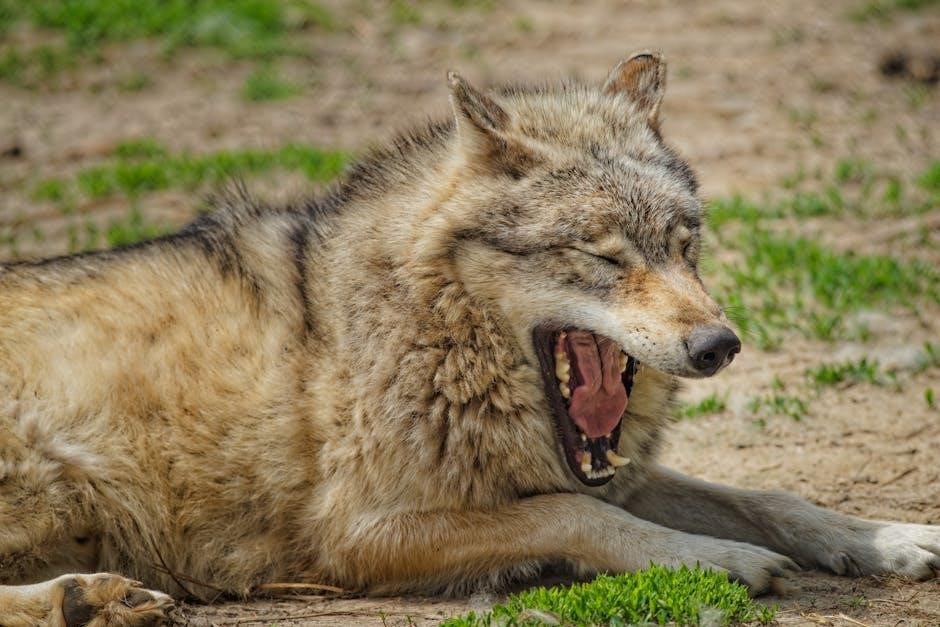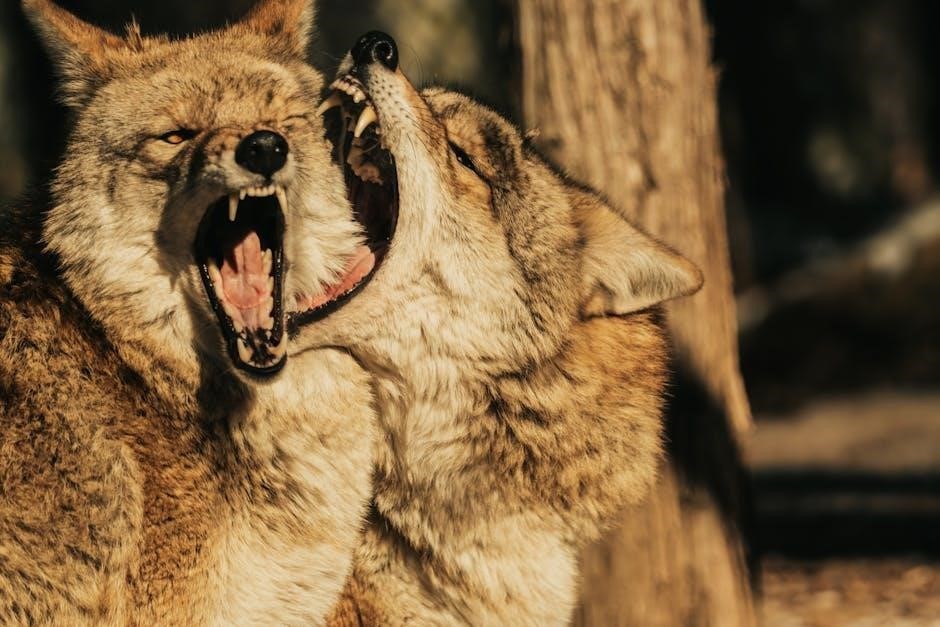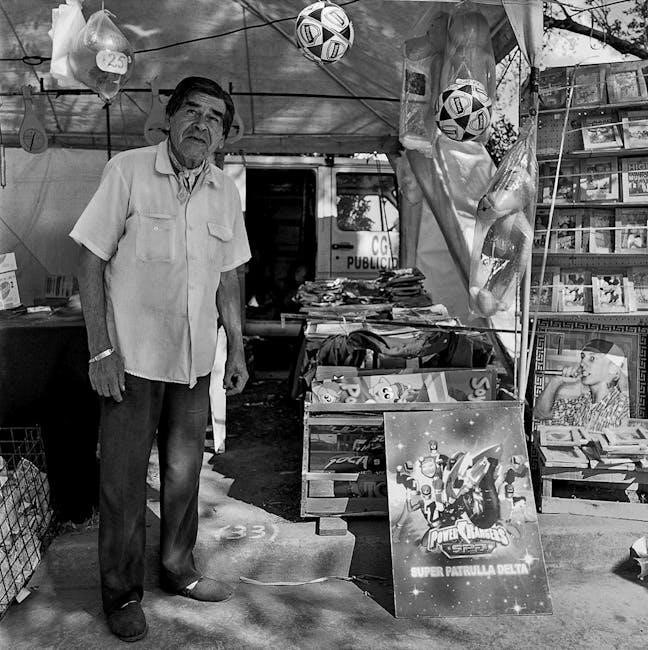Wolf Hollow: An Overview
Wolf Hollow, penned by Lauren Wolk, transports readers to rural Pennsylvania during World War II․ The narrative follows Annabelle as her tranquil existence is disrupted by a new, malevolent presence․ This compelling novel explores themes of bullying, injustice, and moral complexities through the eyes of a young girl navigating challenging times․
Plot Summary of Wolf Hollow
Set in the autumn of 1943 in rural Pennsylvania, Wolf Hollow tells the story of Annabelle McBride, a young girl whose peaceful life is shattered by the arrival of Betty Glengarry, a cruel and manipulative new student․ Betty’s presence brings a wave of torment and fear to Annabelle’s school and community․
Initially, Betty targets Annabelle with relentless bullying, stealing her belongings and threatening her․ The situation escalates when Betty accuses Toby, a quiet and misunderstood World War I veteran who lives on the fringes of society, of attacking her․ The community, already wary of Toby, quickly turns against him, fueled by Betty’s lies․
As Betty’s accusations mount and the evidence seems to point towards Toby, Annabelle begins to question the narrative being presented․ She knows Toby to be a gentle soul, despite his unusual appearance and solitary nature․ Driven by a sense of justice and compassion, Annabelle embarks on a quest to uncover the truth and clear Toby’s name․
Her investigation leads her down a dangerous path, forcing her to confront Betty’s lies and the prejudices of her community․ Annabelle faces moral dilemmas as she grapples with the consequences of her actions and the potential harm that could come to Toby․ Ultimately, she must find the courage to speak the truth, even when it means standing alone against the tide of public opinion․

Annabelle McBride: The Protagonist
Annabelle McBride, the heart and soul of Wolf Hollow, is a twelve-year-old girl living a simple, idyllic life on her family’s farm in rural Pennsylvania during World War II․ She is portrayed as a thoughtful, observant, and compassionate child, deeply connected to her family and the natural world around her․
Annabelle’s peaceful existence is disrupted by the arrival of Betty Glengarry, whose cruelty and lies force Annabelle to confront the harsh realities of the world beyond her sheltered farm life․ As she witnesses the injustice inflicted upon Toby, a misunderstood war veteran, Annabelle’s sense of right and wrong is ignited․
Driven by her innate goodness and a growing understanding of the complexities of human nature, Annabelle embarks on a journey of moral awakening․ She grapples with difficult choices, torn between loyalty to her family and her conviction that Toby is innocent․ Her courage and determination are tested as she faces the prejudices and fears of her community․
Annabelle’s character arc is one of growth and transformation․ She learns to question authority, to think critically, and to stand up for what she believes in, even when it means facing opposition and risking her own safety․ Through her experiences, Annabelle embodies the themes of empathy, justice, and the power of individual action․
Betty Glengarry: The Antagonist and Bully
Betty Glengarry serves as the primary antagonist in Wolf Hollow, embodying the cruelty and injustice that disrupt Annabelle’s peaceful life․ Her arrival in Wolf Hollow marks the beginning of a series of events that challenge Annabelle’s understanding of the world and force her to confront the darker aspects of human nature․ Betty’s behavior is characterized by maliciousness, manipulation, and a complete lack of empathy․
She terrorizes Annabelle and other children in the community, engaging in acts of physical and emotional abuse․ Betty’s lies and false accusations are particularly damaging, as they target vulnerable individuals and exploit the prejudices of the community․ Her willingness to inflict pain and suffering on others reveals a deeply troubled character․
Betty’s motivations are not explicitly explored, leaving her actions shrouded in a sense of mystery․ Whether driven by insecurity, a troubled past, or simply a desire for power, her cruelty has a profound impact on the lives of those around her․ She represents the destructive potential of unchecked aggression and the dangers of blindly accepting accusations without questioning their validity․
Through Betty Glengarry, Lauren Wolk highlights the devastating consequences of bullying and the importance of standing up to injustice․ Her character serves as a stark reminder of the need for empathy, understanding, and the courage to challenge those who abuse their power․
Toby: The Misunderstood Character
Toby, a transient figure in Wolf Hollow, embodies the theme of prejudice and the dangers of judging individuals based on appearances․ A veteran of World War I, he roams the hills around Wolf Hollow, carrying his belongings and keeping to himself․ His unconventional appearance and solitary nature make him an easy target for suspicion and fear, particularly in the eyes of those quick to judge․
Despite his intimidating presence, Toby is portrayed as a gentle and compassionate soul․ He possesses a deep connection to nature and demonstrates kindness towards animals and those in need․ Annabelle, unlike many others in the community, recognizes Toby’s inherent goodness and forms a bond with him based on mutual respect and understanding․
Toby becomes a scapegoat when Betty Glengarry’s malicious actions escalate, and he is falsely accused of a crime he did not commit․ The community’s rush to judgment highlights the dangers of prejudice and the ease with which innocent individuals can be condemned based on unfounded fears;
Through Toby’s character, Lauren Wolk challenges readers to question their own biases and to consider the perspectives of those who are different․ He serves as a reminder that appearances can be deceiving and that true understanding requires empathy, compassion, and a willingness to look beyond superficial judgments․ His tragic fate underscores the devastating consequences of prejudice and the importance of standing up for those who are unjustly accused․
Setting: Rural Pennsylvania During World War II
The setting of Wolf Hollow, rural Pennsylvania during World War II, plays a crucial role in shaping the narrative and themes of the novel․ The time period and location provide a backdrop of both tranquility and underlying tension, influencing the characters’ lives and experiences․
The close-knit community of Wolf Hollow is characterized by its traditional values and reliance on agriculture․ The families who reside there have deep roots in the land, and their lives are intimately connected to the rhythms of nature․ This sense of community, however, is also marked by insularity and a tendency to be suspicious of outsiders․
The backdrop of World War II casts a shadow over the lives of the characters, even in their remote rural setting․ The war brings a sense of uncertainty and fear, as young men from the community are sent off to fight․ The war also influences the community’s perception of outsiders, as they become more wary of strangers and those who are different․
The physical landscape of Wolf Hollow, with its rolling hills, dense forests, and hidden hollows, contributes to the atmosphere of mystery and suspense in the novel․ The natural world provides both solace and danger for the characters, and it serves as a metaphor for the hidden depths of human nature․
Through its vivid depiction of rural Pennsylvania during World War II, Wolf Hollow creates a compelling and immersive setting that enhances the novel’s exploration of themes such as prejudice, injustice, and the importance of compassion․
Themes of Bullying and Injustice
Wolf Hollow delves deeply into the pervasive themes of bullying and injustice, showcasing their devastating impact on individuals and communities․ The novel illustrates how these forces can erode innocence, distort perceptions, and lead to tragic consequences․ Lauren Wolk masterfully portrays the complexities of these issues, prompting readers to confront uncomfortable truths about human nature and societal structures․
Betty Glengarry, the novel’s antagonist, embodies the destructive nature of bullying․ Her cruelty extends beyond typical childhood teasing, manifesting in manipulative and harmful actions that inflict emotional and physical pain on others․ Betty’s behavior highlights the power dynamics inherent in bullying, where the perpetrator seeks to exert control and dominance over their victims․
The injustice in Wolf Hollow is further amplified by the community’s tendency to ostracize and scapegoat those who are different or misunderstood․ Toby, a kind and gentle man haunted by his experiences in war, becomes a target of suspicion and prejudice due to his unconventional lifestyle and perceived strangeness․ This illustrates how fear and ignorance can fuel injustice, leading to the persecution of innocent individuals․
Through Annabelle’s journey, the novel explores the challenges of confronting bullying and injustice․ Annabelle grapples with her own moral compass as she witnesses the suffering caused by Betty and the unfair treatment of Toby․ Her struggle to find her voice and stand up for what is right underscores the importance of courage and empathy in the face of adversity․
Wolf Hollow serves as a powerful reminder of the devastating effects of bullying and injustice, urging readers to recognize and challenge these forces in their own lives and communities․
Courage and Compassion in Wolf Hollow
Amidst the darkness of bullying and injustice that permeates Wolf Hollow, the themes of courage and compassion shine brightly, offering a beacon of hope and resilience․ Lauren Wolk intricately weaves these qualities into the narrative, demonstrating their transformative power in the face of adversity․ The story emphasizes that even in the most challenging circumstances, acts of bravery and kindness can make a profound difference․
Annabelle McBride embodies both courage and compassion throughout the novel․ Despite her young age, she displays remarkable bravery in confronting Betty’s cruelty and standing up for what she believes is right․ Annabelle’s compassion extends to Toby, the misunderstood outcast, whom she befriends and defends against the community’s prejudice․ Her willingness to see beyond appearances and offer empathy to those in need highlights the importance of human connection․
Toby himself exemplifies courage in his quiet resilience․ Despite the hardships he has faced and the unjust treatment he receives, he maintains a sense of dignity and inner strength․ His gentle nature and willingness to help others, even in the face of adversity, demonstrate the power of compassion to transcend difficult circumstances․
The novel also showcases the courage of Annabelle’s family, who provide her with a strong moral foundation and support her decisions, even when they are difficult․ Their unwavering love and guidance empower Annabelle to navigate the complexities of her world and make choices that align with her values․
Wolf Hollow ultimately celebrates the enduring power of courage and compassion, reminding readers that even small acts of kindness and bravery can have a significant impact on the lives of others and contribute to a more just and compassionate world․

Moral Dilemmas Faced by Annabelle
Annabelle McBride, the young protagonist of Wolf Hollow, grapples with a series of complex moral dilemmas that challenge her understanding of right and wrong․ As she witnesses the cruelty and injustice inflicted upon others, Annabelle is forced to confront difficult choices that test her values and shape her character․ These moral quandaries form the core of her coming-of-age journey, highlighting the complexities of navigating a world where simple answers are elusive․
One of the central moral dilemmas Annabelle faces revolves around the question of truth and lies․ As Betty’s accusations escalate, Annabelle is torn between protecting herself and her family and speaking out against the injustice she witnesses․ She struggles with the knowledge that telling the truth could have dire consequences for those she loves, while remaining silent would allow the lies to perpetuate․ This conflict forces her to confront the ethical implications of her actions and the responsibility she bears to uphold justice․
Another significant moral challenge arises from Annabelle’s relationship with Toby․ As she befriends the ostracized man, she is forced to question the community’s prejudices and her own preconceived notions․ Annabelle must decide whether to conform to societal expectations or to stand up for what she believes is right, even if it means facing criticism and ostracism herself; This dilemma highlights the tension between individual conscience and social pressure, forcing Annabelle to define her own moral compass․
Ultimately, Annabelle’s moral dilemmas force her to confront the complexities of human nature and the challenges of living in a world where injustice prevails․ Through her struggles, she learns the importance of empathy, courage, and the unwavering commitment to doing what is right, even when it is difficult․

Comparison to Other Young Adult Novels
Wolf Hollow stands as a unique contribution to the young adult literary landscape, yet it shares thematic and stylistic similarities with other notable works in the genre․ Like Harper Lee’s To Kill a Mockingbird, Wolk’s novel explores themes of prejudice, injustice, and the loss of innocence through the eyes of a young protagonist․ Both stories are set in a specific historical context and feature characters who challenge societal norms․
Another point of comparison can be drawn with Mildred D․ Taylor’s Roll of Thunder, Hear My Cry, which also tackles issues of racial prejudice and social inequality in a rural setting․ Both novels feature strong female protagonists who learn to navigate a world marred by injustice and discrimination․
However, Wolf Hollow distinguishes itself through its exploration of moral ambiguity and the complexities of human nature․ Unlike some young adult novels that present clear-cut heroes and villains, Wolk’s characters are nuanced and flawed, making their choices all the more compelling․ The novel also delves into the psychological impact of bullying and the challenges of standing up to injustice, themes that resonate with contemporary readers․
While Wolf Hollow shares common ground with other young adult novels in its exploration of important social issues, it ultimately offers a unique and thought-provoking perspective on the human condition․ Its focus on moral dilemmas, complex characters, and historical context sets it apart as a powerful and enduring work of literature․

Lauren Wolk: The Author
Lauren Wolk is an acclaimed American author known for her compelling and thought-provoking novels for young readers․ Born and raised in Pittsburgh, Pennsylvania, Wolk draws inspiration from her childhood experiences and her deep connection to the natural world, particularly the landscapes of rural Pennsylvania․ This influence is evident in her vivid descriptions of the setting in Wolf Hollow․
Before embarking on her career as a novelist, Wolk worked as a teacher and a poet, honing her skills in storytelling and language․ Her writing is characterized by its lyrical prose, strong character development, and exploration of complex themes․ She often tackles difficult subjects, such as bullying, prejudice, and moral ambiguity, with sensitivity and nuance, making her novels both engaging and thought-provoking․
Wolf Hollow, published in 2016, marked a significant milestone in Wolk’s career, earning her widespread recognition and critical acclaim․ The novel’s success led to further works, including Beyond the Bright Sea and Echo Mountain, which have also garnered numerous awards and accolades․
Wolk’s writing style is often compared to that of classic authors such as Harper Lee and Mildred D․ Taylor, reflecting her commitment to exploring timeless themes through the lens of young protagonists․ Her novels invite readers to consider important questions about justice, compassion, and the human condition, solidifying her place as a prominent voice in contemporary young adult literature․
Wolf Hollow: A Newbery Honor Book
Wolf Hollow received the prestigious Newbery Honor in 2017, a testament to its exceptional quality and significant contribution to children’s literature․ This award, presented annually by the American Library Association, recognizes the most distinguished American children’s books published the previous year․
The Newbery Honor designation signifies that Wolf Hollow stood out among a highly competitive field of books, showcasing its literary merit, originality, and enduring appeal to young readers․ The award acknowledged Lauren Wolk’s masterful storytelling, her ability to create compelling characters, and her exploration of complex themes relevant to young audiences․
The Newbery recognition brought Wolf Hollow to a wider audience, increasing its visibility and solidifying its place as a must-read for young readers and educators alike․ Libraries and schools across the country embraced the novel, incorporating it into curricula and recommending it to students seeking engaging and thought-provoking stories․
Beyond its literary achievements, the Newbery Honor also highlighted the importance of the themes explored in Wolf Hollow, such as bullying, injustice, and the power of compassion․ The award served as a catalyst for discussions about these critical issues, encouraging young readers to reflect on their own experiences and consider the impact of their actions on others․
The Newbery Honor cemented Wolf Hollow‘s legacy as a timeless and important work of children’s literature, ensuring that its message of courage, empathy, and moral responsibility continues to resonate with readers for generations to come․



